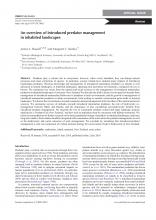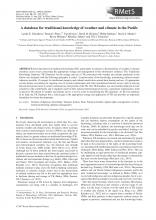An overview of introduced predator management in inhabited landscapes

BRB
Available Online
Russell, James C.
,
Stanley, Margaret C.
2017
Predators play a critical role in ecosystems; however, when overly abundant, they can disrupt natural processes and cause extinctions of species. In particular, oceanic islands have endured many impacts of introduced mammalian predators. Whereas knowledge and management of introduced mammalian predators on islands is well advanced in natural landscapes, in inhabited landscapes, spanning rural and urban environments, comparatively less is known. We summarise key issues from the natural and social sciences in the management of introduced mammalian predators in inhabited landscapes of AotearoaNew Zealand. We describe the shift in focus over the past few decades from management of introduced mammalian herbivores to predators in rural environments, and the growth in management of introduced mammalian predators in urban environments, both seeking to emulate conservation gains made in forested landscapes. We discuss the circumstances around companion animal management at the interface of the natural and social sciences. We summarise surveys of attitudes towards introduced mammalian predators, the role of biodiversity comanagement between Ma¯ori and Pakeha, and the importance of also considering non-biodiversity benefits from introduced predator management. We describe the rise of community predator control and large landscape projects aspiring for a Predator Free New Zealand, and how such an aspiration must be concurrent with habitat restoration. We make recommendations for further research on the basic population biology of predators in inhabited landscapes, and more long-term studies. Such studies should be integrated with examination of the motivations for predator management, as well as the biodiversity and social outcomes of such management. We conclude by remarking that introduced predator management is only one component of a robust national strategy for conservation of native biodiversity in New Zealand.






